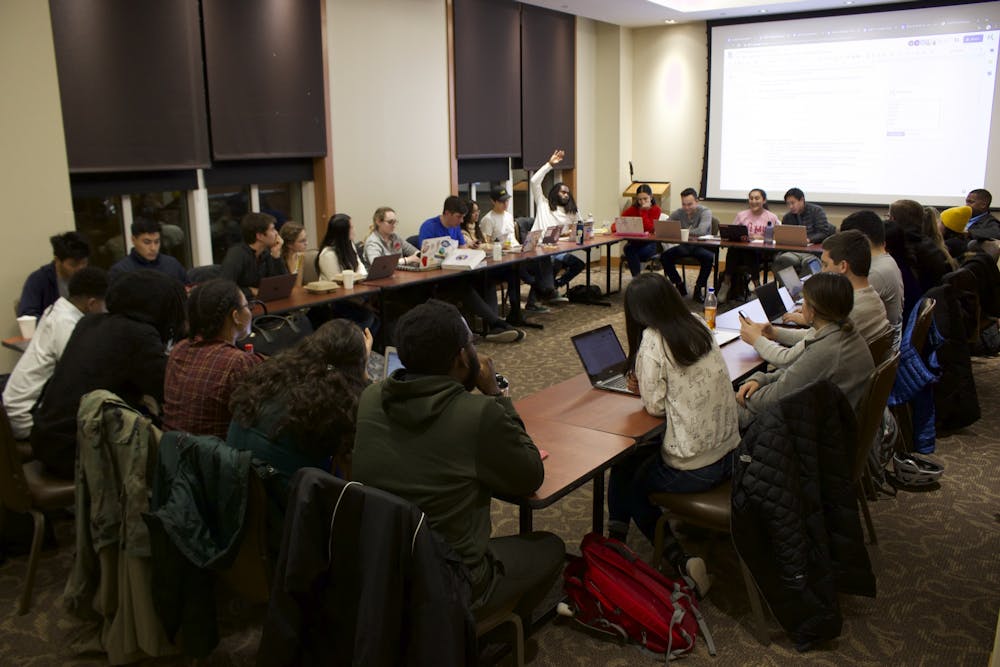This year, our Student Government Association (SGA) sought to fix the student organization culture here at Hopkins. Unfortunately, they’ve ignored student interests at every step in the process, while failing at basic administrative tasks required to help student leaders adapt to the changes being forced upon them.
Mandates to ban new clubs for this semester and open all club admissions may have been well-intended, but they have harmed the college experience for hundreds of new first-years and promise to destroy club operations to the detriment of thousands more.
SGA’s flagship new club policy mandates that all clubs under their supervision accept all who wish to join, though this does not apply to sports teams, performing arts groups and Greek life. We agree that for many student organizations, this is a needed change. In general, students should not have to jump through endless applications and interviews to pursue the interests they enjoy.
But student organizations on campus have exclusive admissions policies for a reason. For organizations that travel, it’s impossible to bring the amount of people that apply to their clubs to events with a limited budget. For organizations that require intense training processes, open membership can make it impossible for senior club members to ensure everyone has the training they need to perform their duties properly.
In addition, SGA’s ban on new student organizations for this semester is harmful to students’ personal and academic self-realization. Since the student group approval process has been suspended, those who see an unmet cultural, social or academic need on campus are incapable of addressing it.
Even basic institutional support such as space at the Student Leadership and Involvement (SLI) Fair is denied them. While we understand that the process of student group spending was and is a flawed one, to punish students and restrict their ability to organize and express themselves is the wrong approach to take.
Likewise, the proposed reforms do little to substantively improve the byzantine budgetary and spending process. Allowing students to see how much money remained in student accounts was a positive step. However, SLI’s process of approving even the smallest purchases is achingly slow and inefficient.
Often, this can impact economically disadvantaged students the most.They may not be able to afford an outlay for a club activity and wait weeks to receive a reimbursement.
These failures have been coupled with a troubling lack of communication. Incomplete emails lacking the names of the organizations they were addressed to were sent out, saying student groups had to meet with SLI or risk suspension. These emails contained no information about what club leaders had to review or be ready to discuss, and no indication of the supposed violations each club had. Attempts by many students to contact SGA by replying to the email went unanswered.
As a result, students came to meetings unprepared to discuss constitutional details or budgetary processes. Instead of helping clubs meet University policy, these meetings simply served to intimidate club leaders and make things worse. Unclear timelines and requirements forced groups to delay planning for events later in the year, harming their operations at a critical time.
Defenders of these policies will likely say that they are making the best of a bad situation. After all, The News-Letter has reported that the Parents Fund is forcing changes like the open admissions policy and student group audits because they don’t like how their money is being spent. But passing the buck isn’t acceptable. SGA’s job is to push back against the administration when they do things that are harmful to the student body.
We know that open club admissions, while beneficial in some cases, will do more harm than good for many student organizations. Instead of aiding in the process, SGA must take responsibility for representing their constituents and negotiate with the Parents Fund for more nuance in club admissions. With the ban on new student groups amid budget problems, SGA should push SLI to take accountability for their own failures instead of punishing student groups by slashing their budgets and restricting their activities with audits. And amidst all these changes, SGA has no excuse for the disregard they have shown their fellow students with their communicative negligence.
If you’re concerned about these issues, the best thing you can do is contact your SGA representatives. Email Chase McAdams, the chair of the Student Organizations Committee in charge of this process, at cmcadam1@jhu.edu. We would include a list of committee members to email, but SGA has gone four months without updating their website. We recommend contacting all of your class senators instead.
We elected our SGA representatives, and it is our right and responsibility to tell them when we think something is wrong. Together, by reaching out to our student government and demanding change, we can fight for an atmosphere that accommodates and empowers diverse interests at Hopkins, instead of sweeping student concerns under the rug for the sake of convenience.
Michael Leff is a junior from Highland Park, N.J. majoring in Molecular and Cellular Biology. He is President of Hopkins American Partnership for Israel. Sam Mollin is a junior majoring in Political Science and Environmental Studies from Larchmont, N.Y. He is a former SGA senator and a Staff Writer for The News-Letter.
Errata: The article originally mentioned Spring Fair as a student group being audited by SGA. The club is undergoing an unrelated review.
The article also stated that HERO and A Place To Talk may be impacted by the open membership policies. Neither is under SGA’s jurisdiction, and the organizations will not be affected by these policies.
The News-Letter regrets these errors.





